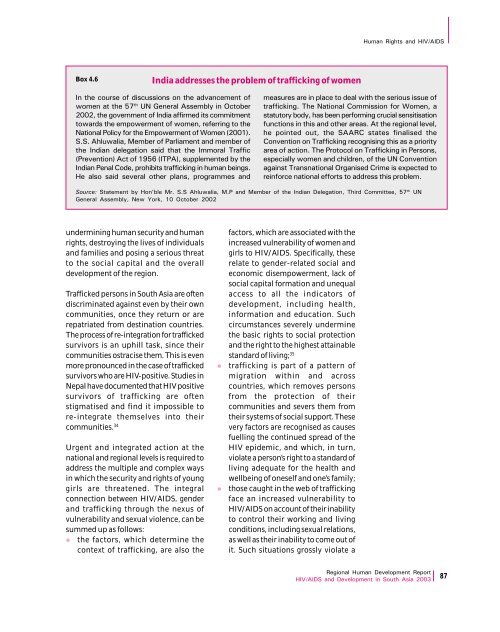Download Report - UNDP Asia-Pacific Regional Centre - United ...
Download Report - UNDP Asia-Pacific Regional Centre - United ...
Download Report - UNDP Asia-Pacific Regional Centre - United ...
You also want an ePaper? Increase the reach of your titles
YUMPU automatically turns print PDFs into web optimized ePapers that Google loves.
Human Rights and HIV/AIDSBox 4.6India addresses the problem of trafficking of womenIn the course of discussions on the advancement ofwomen at the 57 th UN General Assembly in October2002, the government of India affirmed its commitmenttowards the empowerment of women, referring to theNational Policy for the Empowerment of Women (2001).S.S. Ahluwalia, Member of Parliament and member ofthe Indian delegation said that the Immoral Traffic(Prevention) Act of 1956 (ITPA), supplemented by theIndian Penal Code, prohibits trafficking in human beings.He also said several other plans, programmes andmeasures are in place to deal with the serious issue oftrafficking. The National Commission for Women, astatutory body, has been performing crucial sensitisationfunctions in this and other areas. At the regional level,he pointed out, the SAARC states finalised theConvention on Trafficking recognising this as a priorityarea of action. The Protocol on Trafficking in Persons,especially women and children, of the UN Conventionagainst Transnational Organised Crime is expected toreinforce national efforts to address this problem.Source: Statement by Hon’ble Mr. S.S Ahluwalia, M.P and Member of the Indian Delegation, Third Committee, 57 th UNGeneral Assembly, New York, 10 October 2002undermining human security and humanrights, destroying the lives of individualsand families and posing a serious threatto the social capital and the overalldevelopment of the region.Trafficked persons in South <strong>Asia</strong> are oftendiscriminated against even by their owncommunities, once they return or arerepatriated from destination countries.The process of re-integration for traffickedsurvivors is an uphill task, since theircommunities ostracise them. This is evenmore pronounced in the case of traffickedsurvivors who are HIV-positive. Studies inNepal have documented that HIV positivesurvivors of trafficking are oftenstigmatised and find it impossible tore-integrate themselves into theircommunities. 34Urgent and integrated action at thenational and regional levels is required toaddress the multiple and complex waysin which the security and rights of younggirls are threatened. The integralconnection between HIV/AIDS, genderand trafficking through the nexus ofvulnerability and sexual violence, can besummed up as follows:l the factors, which determine thecontext of trafficking, are also thellfactors, which are associated with theincreased vulnerability of women andgirls to HIV/AIDS. Specifically, theserelate to gender-related social andeconomic disempowerment, lack ofsocial capital formation and unequalaccess to all the indicators ofdevelopment, including health,information and education. Suchcircumstances severely underminethe basic rights to social protectionand the right to the highest attainablestandard of living; 35trafficking is part of a pattern ofmigration within and acrosscountries, which removes personsfrom the protection of theircommunities and severs them fromtheir systems of social support. Thesevery factors are recognised as causesfuelling the continued spread of theHIV epidemic, and which, in turn,violate a person’s right to a standard ofliving adequate for the health andwellbeing of oneself and one’s family;those caught in the web of traffickingface an increased vulnerability toHIV/AIDS on account of their inabilityto control their working and livingconditions, including sexual relations,as well as their inability to come out ofit. Such situations grossly violate a<strong>Regional</strong> Human Development <strong>Report</strong>HIV/AIDS and Development in South <strong>Asia</strong> 2003 87
















